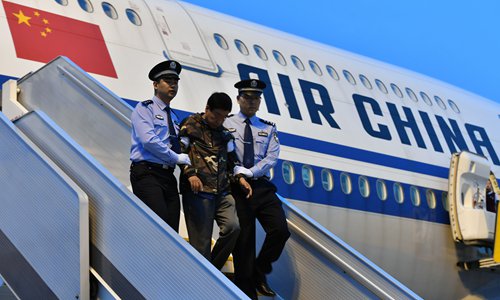HOME >> CHINA
Nation arrests 6,690 fugitives in anti-graft drive
By Ji Yuqiao Source:Global Times Published: 2019/12/9 23:03:40

Liu Changkai, one of China's most wanted fugitives, returns to the Chinese mainland to turn himself in to police. Photo: VCG
Since China launched its anti-corruption campaign Skynet Operation in 2015, 6,690 fugitives who fled overseas have been repatriated and some 15.1 billion yuan ($2.1 billion) in unlawfully gained assets have been recovered, official data shows."Chinese anti-corruption authorities repatriated 1,634 fugitives from January to October 2019, including 741 members of the Communist Party of China (CPC) and officials, according to a Central Commission for Discipline Inspection of the CPC report.
In the new round of Skynet Operation in 2019, the number of repatriated fugitives and amount of recovered illicit money have increased 69 percent year-on-year and 288 percent, respectively, the report said.
This is the first time that the commission took the lead in overseas hunts, arresting four suspects who hid abroad, with the cooperation of other countries.
"These anti-corruption achievements have risen since the 18th National Congress of CPC, and in the future, the campaign will have more positive effects," said Ren Jianming, a professor at the School of Public Administration of Beihang University.
However, repatriating fugitives overseas still faces difficulties, as signing extradition agreements with other countries remain difficult due to difference in the understanding of rule of law, which obstructs repatriations, Ren said.
Against such backdrop, Chinese anti-corruption authorities have come up with creative ways to handle cases, such as persuading fugitives to return to China or hiring local lawyers to sue fugitives, Ren added.
The report cited the case of Li Huabo, a fugitive who fled to Singapore, for example to illustrate new measures. Li was sentenced to 15 months in prison by the local court and returned all the illicit money to China after being sued in 2011 in Singapore.
RELATED ARTICLES:
Posted in: SOCIETY,CHINA FOCUS